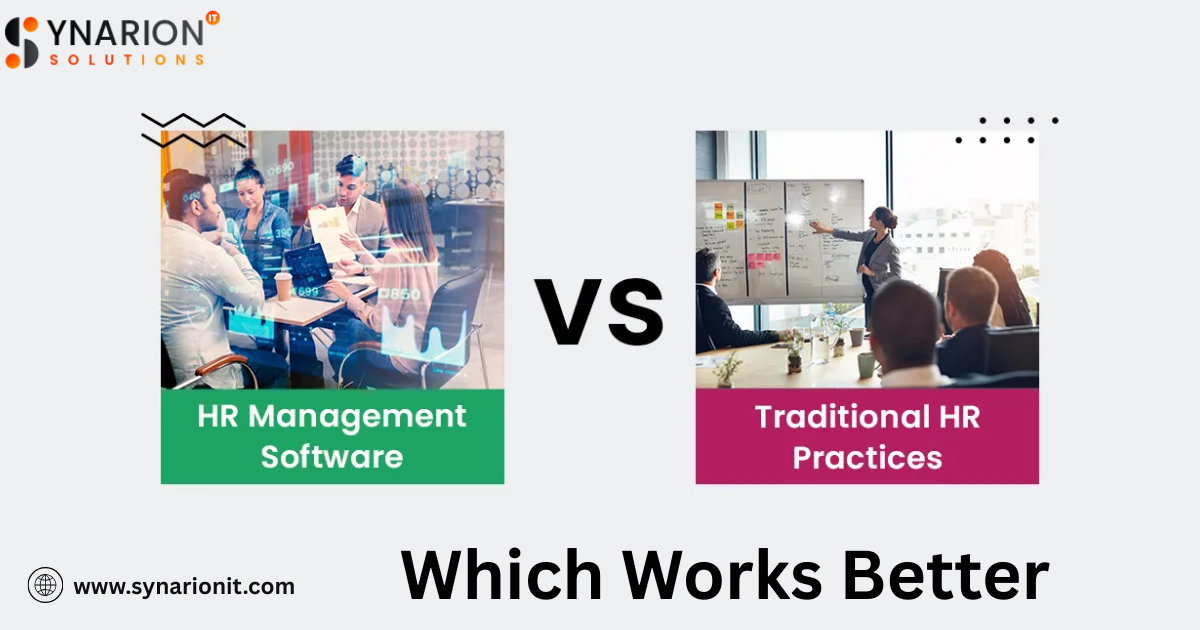Human Resource Management (HRM) has always been the backbone of every successful organization. From hiring and payroll to employee engagement and compliance, HR practices play a crucial role in shaping workplace culture and productivity.
Traditionally, HR relied on manual processes—paper files, spreadsheets, and face-to-face meetings. While these methods worked in the past, today’s fast-paced business environment demands more efficient, data-driven solutions. This is where HRM software development comes in, offering automation, scalability, and smarter management of human resources.
In this blog, we’ll compare HRM software with traditional HR practices, explore their pros and cons, and highlight why businesses are increasingly partnering with an HRM software development company to modernize their HR operations.
Understanding Traditional HR Practices
Traditional HR practices involve manual record-keeping and human-driven processes. Some common elements include:
- Paper-based Employee Records – Files and documents stored physically.
- Manual Attendance Tracking – Punch cards, registers, or spreadsheets.
- Face-to-Face Recruitment – Job postings in newspapers and offline interviews.
- Manual Payroll Processing – Calculations done through Excel or by hand.
- Employee Engagement via Meetings – In-person feedback sessions and appraisals.
Advantages of Traditional HR Practices
- Personal Touch: Direct interaction creates stronger relationships.
- Low Initial Investment: No need for advanced technology or software.
- Simplicity: Easy to implement for very small businesses with limited staff.
Limitations of Traditional HR Practices
- Time-Consuming: Manual paperwork slows down operations.
- Error-Prone: Payroll and attendance errors are common.
- Limited Data Insights: No advanced analytics for decision-making.
- Scalability Issues: Difficult to manage when the workforce grows.
- Compliance Risks: Harder to track labor laws and regulations manually.
What is HRM Software?
HRM software is a technology-driven platform that simplifies and automates HR tasks. It covers everything from hiring and onboarding to payroll, attendance, performance reviews, and employee engagement.
With custom HRM software development, businesses can create tailored systems that fit their unique needs, ensuring greater efficiency and accuracy compared to manual HR practices.
Key Features of HRM Software
- Automated Payroll Management – Accurate salary calculations, tax deductions, and compliance.
- Attendance & Leave Tracking – Integrated biometric or digital attendance systems
- Recruitment & Onboarding – Job postings, candidate tracking, and digital onboarding.
- Employee Self-Service Portal – Employees can view payslips, apply for leave, and update profiles.
- Performance Management – Real-time appraisals, feedback, and goal tracking.
- Data Analytics & Reports – Insights into employee performance, retention, and workforce trends.
- Compliance Management – Built-in alerts for labor law and tax compliance.
HRM Software vs Traditional HR Practices: A Direct Comparison
| Aspect | Traditional HR Practices | HRM Software |
| Efficiency | Manual, time-consuming processes | Automated, saves time & effort |
| Accuracy | Prone to human errors in payroll & records | Highly accurate with reduced errors |
| Data Management | Paper files & spreadsheets | Cloud-based storage with easy access |
| Scalability | Struggles with a larger workforce | Easily scales with business growth |
| Employee Engagement | In-person meetings, limited tracking | Continuous feedback, surveys, and digital engagement tools |
| Compliance | Risk of missing updates in labor laws | Automatic compliance updates & reminders |
| Cost | Low initial investment, but higher long-term costs due to inefficiency | Higher upfront investment, but long-term cost savings |
Why Businesses Prefer HRM Software Today
- Automation Saves Time
Tasks like payroll, attendance, and leave approvals are automated, freeing HR professionals to focus on strategic work. - Data-Driven Insights
Unlike traditional HR, modern systems offer detailed reports to improve decision-making. - Remote & Hybrid Work Support
With remote work becoming common, HRM software ensures employees can log in, track attendance, and collaborate from anywhere. - Improved Employee Experience
Employee self-service portals allow staff to handle routine tasks independently, minimizing HR involvement. - Long-Term Cost Efficiency
Although software requires upfront investment, businesses save on manpower, errors, and compliance risks.
Role of an HRM Software Development Company
Building the right HR solution requires expertise. A professional HRM software development company helps businesses by:
- Customizing Solutions: Developing software tailored to specific HR needs.
- Ensuring Integration: Connecting HRM systems with payroll, ERP, and other business tools.
- Security & Compliance: Implementing data encryption and ensuring labor law compliance.
- Scalability: Building systems that grow with the organization.
- Ongoing Support: Providing updates, maintenance, and feature enhancements.
Whether you are a small business or a large enterprise, partnering with an experienced HRM software development company ensures that your HR operations remain smooth, efficient, and future-ready.
Challenges in Implementing HRM Software
While HRM software has clear advantages, businesses may face challenges like:
- High Initial Investment: Some businesses hesitate due to upfront costs.
- Employee Resistance: Shifting from manual to digital may face pushback.
- Training Requirements: Employees need to adapt to the new system.
- Data Migration: Moving from paper/spreadsheets to digital requires careful planning.
However, with the right development partner and proper training, these challenges can be overcome.
Future of HRM Software
The future of HR lies in technology-driven solutions. Emerging trends include:
- AI-Powered Recruitment – Automated candidate screening and skill matching.
- Predictive Analytics – Forecasting employee performance and turnover.
- Chatbots for HR Support – Answering employee queries instantly.
- Mobile HR Apps – Employees managing HR tasks on the go.
- Blockchain for Records – Secure employee verification and payroll transparency.
These innovations will continue to push HRM software ahead of traditional practices.
Final Thoughts
While traditional HR practices have their charm and human touch, they can no longer keep up with modern business demands. HRM software development offers efficiency, accuracy, and scalability that manual methods simply cannot match.
For entrepreneurs and enterprises, investing in HRM software is no longer a luxury but a necessity. By partnering with an experienced HRM software development company, businesses can streamline operations, improve employee satisfaction, and make smarter decisions powered by data.
In the debate between HRM software vs traditional HR practices, the winner is clear—digital transformation is the way forward. Businesses that adopt HRM software today will be better positioned to succeed in the workplaces of tomorrow.



